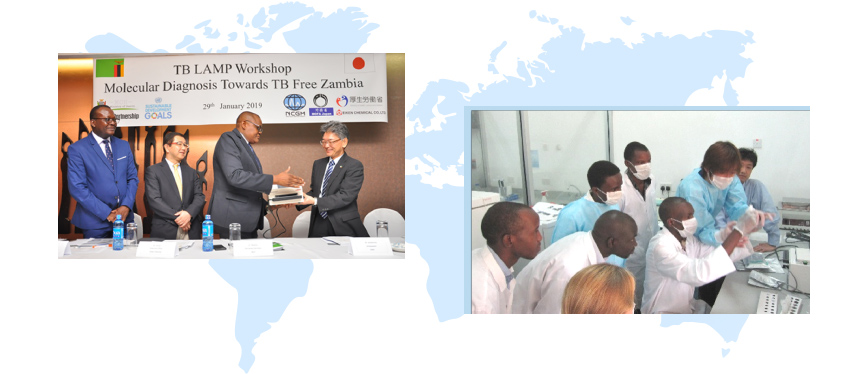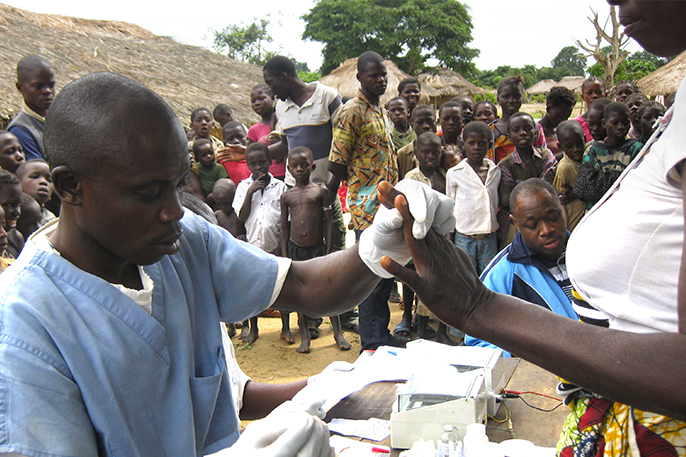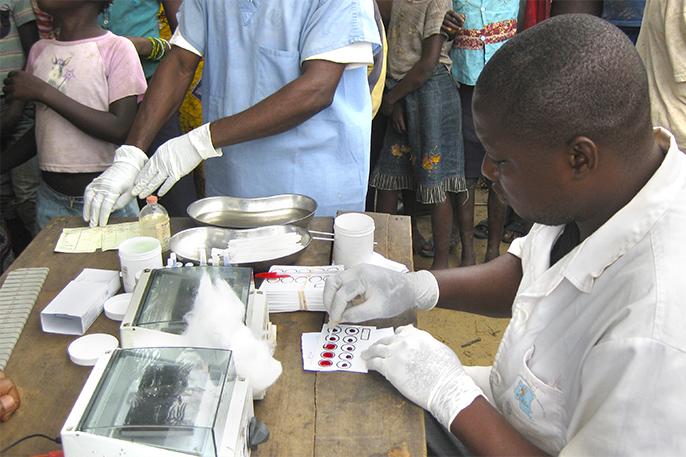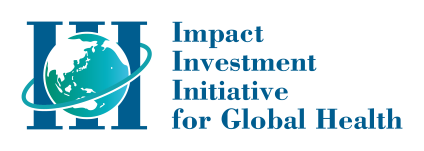Medical
About Us


Sustainability
Medical
Around the world there are a number of countries and regions where people are unable to obtain sufficient healthcare. This unfortunate situation arises from a wide range of social factors, including the medical environment, medical systems, the state of public hygiene and education, and income disparity.
One serious social problem consists of the human and economic losses that accompany the spread of infectious disease. In many developing and emerging countries, poverty aggravates the spread of infectious disease, engendering declines in the workforce and productivity. Rising numbers of infected cause poverty to worsen, driving a cruel downward spiral.
Improving access to medical products is an effective approach for fighting infectious disease. In country after country, such measures can lead to economic growth and the eradication of poverty over the long term.
The Eiken Group has formulated a “Healthcare Access Policy.” We work every day to improve access to healthcare, to protect the lives and health of people around the world. These efforts contribute toward the Sustainable Development Goals (SDGs) advocated by the United Nations, especially Goal 3, “Ensure healthy lives and promote well-being for all at all ages.”
Barriers to access to healthcare are a serious social issue affecting people’s health and well-being.
The management philosophy of the Eiken Group is, “Protect the health of the public through healthcare services.” The EIKEN WAY declares that the Group’s duty to stakeholders is to “provide products and services enabling anyone to be tested with confidence, anywhere and at any time.” Through the following activities, the Eiken Group is creating solutions to improve healthcare access.
1Research and Development
Underpinned by loop-mediated isothermal amplification (LAMP), a gene amplification technology developed exclusively by Eiken, the Group is leveraging global partnerships to achieve open innovation aiming to address unmet medical needs.
・Expansion of range of diagnostic agents (particularly for neglected tropical diseases (NTDs))
・Improvement of diagnostic agents for use in developing and emerging countries
2Improvement of Access to Healthcare
To deliver its diagnostic agents to the people around the world who need it, Eiken thoroughly surveys conditions in each national market and collaborates with a wide range of partners to improve access to healthcare there.
・Expanding the number of countries in which we distribute products (for tuberculosis, malaria, NTDs and fecal occult blood tests)
・Achieving primary healthcare and universal health coverage (UHC)
3Improvement of Healthcare Infrastructure
Infectious disease can strike anywhere and requires rapid testing. LAMP requires no cold storage of reagents and can run on portable solar panels or batteries, so it can be used to perform genetic testing in developing countries where the power infrastructure is poor or medical care is scarce.
・Eiken is collaborating with a wide range of partners to carry out rapid testing in areas where infectious disease is spreading,
・Provision of diagnostic systems that can be operate in areas of poor infrastructure
Two of the world’s three great infectious diseases, tuberculosis and malaria, have good prognoses if diagnosed early. Unfortunately, in many developing countries, inadequate access to medical care means that the necessary clinical testing is not performed, with the result that the disease proliferates and many people lose their lives. Moreover, for a group of diseases known as neglected tropical diseases (NTDs), it is known that often effective treatments fail to be established, and access to the necessary medical care is not made available, simply because the market value of such treatments is low. One of the targets of the Sustainable Development Goals (SDGs) is to end the spread of these infectious diseases by 2030. To provide a solution to this issue, the Eiken Group developed a unique technology called the LAMP method. Clinical testing systems that apply the LAMP method to test for these infectious diseases enable developing countries to improve access to medical care, thereby avoiding social losses from these afflictions and contributing to economic development. The Eiken Group is also collaborating with governments, health authorities, universities, government agencies and other bodies in each country in efforts to establish and broaden adoption of clinical testing systems.

| Results for FY2024 | Target for FY2027 | Target for FY2030 | |
|---|---|---|---|
| Number of developing countries in which products are deployed | 8 | 13 | 15 |
Every year some 10 million people worldwide contract tuberculosis. For approximately 1.5 million of these sufferers, the disease is fatal. Eiken Chemical developed a tuberculosis detection system, TB-LAMP, using an original Eiken Chemical technology called the LAMP method. In 2016 the World Health Organization (WHO) included this method in its guidelines, recommending it as a replacement for the smear test (sputum smearing test). TB-LAMP is a genetic test used to detect mycobacterium tuberculosis complex (MTBC). In this test, DNA is extracted from the sputum specimen using a dedicated DNA extraction kit (“PURE DNA Extraction Kit”), propagated using minimal equipment and observed under fluorescent light. A decision on the presence of tuberculosis can be made in just an hour and a half. The system can be used with solar panels and batteries, so its use is expected to spread in developing countries with poor electrical infrastructure and in areas where medical services are sparse. In collaboration with governments and healthcare authorities in each country, the Eiken Group is continuing to advance the inclusion of this system in anti-tuberculosis policies and guidance (following proving tests) and to establish screening programs.
Introductory video on the use of TB-LAMP (Cameroon)
Malaria is a global health issue that threatens millions of people around the world, particularly in tropical countries. In 2020, this disease afflicted 241 million people, killing an estimated 627,000 people. The vast majority of these, about 70%, were children under the age of five. Worse still, in a worst-case scenario of the impact of COVID-19, progress against malaria may be set back two decades.
Eiken Chemical is prepared to supply the world with detection reagents for three types of malaria plasmodium, which it has already developed using LAMP: Plasmodium species, Plasmodium falciparum and Plasmodium vivax. Malaria-LAMP can detect P. species with high sensitivity in just an hour and a half. Leveraging this advantage of high sensitivity, Malaria-LAMP can accurately identify malaria patients who are often overlooked by more generally used methods such as microscopy and immunochromatography. Moreover, the exceptional sensitivity of Malaria-LAMP enables it to identify individuals who have just a tiny infection load and exhibit no symptoms. The ability to find such patients in surveillance activities using Malaria-LAMP is expected to prove useful in eradicating malaria in certain regions. By deploying these reagents in as many malaria-afflicted countries as possible, Eiken Chemical aims to contribute to antimalarial efforts worldwide.
Video presentation on malaria surveillance research using Malaria-LAMP (Haiti)
“Neglected tropical diseases (NTDs)” refers to diseases caused by parasites, bacteria, viruses, fungi, etc. that proliferate mainly among the poorest segments of the populations of developing countries, particularly in tropical and subtropical latitudes, whose poverty makes the market for pharmaceuticals to treat such diseases insufficiently attractive to stimulate research and development on drug production. The 20 diseases defined as NTDs by the WHO are said to infect over 1 billion people worldwide, representing a serious social problem.
Thanks to its simplicity and speed, the LAMP method is expected to be applied in the detection of pathogens for the NTDs. In fact, application of the LAMP method is already attested in academic papers for almost all NTD pathogens. Marshaling the technology it cultivated in developing TB-LAMP and Malaria-LAMP, Eiken Chemical is developing LAMP reagents for detection of a number of NTDs. For example, in efforts to eradicate Human African Trypanosomiasis (HAT, also known as sleeping sickness) in connection with Goal 3 of the UN SDGs, a LAMP reagent is being used that detects the pathogen for HAT, a parasite called Trypanosoma brucei, with high sensitivity. Going forward, Eiken Chemical aims to move forward with applications to NTDs other than HAT, such as leishmaniasis and Chagas disease. Our aim is to provide all sufferers of NTDs with access to effective treatment based on rapid, accurate diagnosis.
Reference: Driving elimination of human African trypanosomiasis (HAT) in a challenging transboundary region in line with SDG 3 and SDG target 3.3 - United Nations Partnerships for SDGs platform.


Anti-HAT measures (D.R. Congo)
Origin: Joseph Ndung'u (FIND)
Eiken Chemical has signed the Kigali Declaration, an international public-private partnership for the control of neglected tropical diseases (NTDs). The Declaration is a high-level declaration in which stakeholders pledge to work together for the elimination of NTDs. With the signing of the Declaration, we will further strengthen our collaboration with global partners to provide people affected by NTDs with access to rapid and accurate diagnosis and more effective treatment based on that diagnosis, and to promote efforts to achieve the World Health Organization (WHO) Roadmap 2021-2030 for the control of NTDs. We will continue to promote our efforts.
The Global Health Innovative Technology Fund (GHIT Fund) is an international public-private fund originating in Japan and involving the Japanese government, private companies, the Bill & Melinda Gates Foundation, the UK Wellcome, and the United Nations Development Programme.
Eiken Chemical agrees with the aims of the GHIT Fund, which aims to control infectious diseases through innovations originating in Japan, and participates as a sponsor in addition to participating in the development of products. We hope that this partnership will further accelerate efforts to eliminate infectious diseases in developing countries.

In December 2024, the Eiken Group joined Triple I for Global Health (Impact Investment Initiative for Global Health) , an initiative endorsed by G7 that aims to contribute to solving social issues in the field of global health through accelerating impact investments.
Our main product, the fecal occult blood test, is a screening test for colorectal cancer, contributing to the reduction of global colorectal cancer mortality and the reduction of overall medical costs. In addition, the infectious disease testing system using the LAMP method, a gene amplification technology developed by the company, is used in developing countries and medically depopulated areas where power infrastructure is not yet developed, contributing to the control of social losses caused by infectious diseases such as tuberculosis and malaria and economic development.
By participating in Triple I, we aim to contribute to solving social issues more than ever before.